UCLA Film and Television Archive & The Bijan Amin and Soraya Amin Foundation present
15th ANNUAL CELEBRATION OF IRANIAN CINEMA
Friday, February 11 ? Friday, March 11
This exceptional group of new films and videos from Iran reflects the continuing diversification of filmmaking there as it also highlights the remarkable diversity and youth of the Iranian population. This year?s exceptional crop of documentaries includes portraits of musicians and writers (TWO BOWS; AHMAD MAHMOUD: A NOBLE NOVELIST) and overlooked inhabitants such as the Godar gypsies (INFIDELS), as well as daring depictions of sex and romance in contemporary Iran (THE COLOR OF LOVE, ZOHRE & MANOCHEHR). The fiction films reflect the personal concerns of a new generation of filmmakers concerned about how to move forward at a time that seems to offer more obstacles than hope (SILENCE OF THE SEA, BEAUTIFUL CITY, STORY UNDONE). Our series commences with a stunning depiction of Iraqi Kurds caught in the crossfire of war (TURTLES CAN FLY), which is also this year?s official entry from Iran for Academy Awards consideration. Finally, in recognition of our 15th year during this program, we are delighted to welcome several in-person guests, including filmmakers Bahman Kiarostami, Maryam Keshavarz and Bahman Maghsoudlou, who will all be present to discuss their work.
*Unless otherwise noted, all films will be presented in Persian with English subtitles.
*IN-PERSON: directors Bahman Kiarostami, Maryam Keshavarz and Bahman Maghsoudlou
Friday February 11 2005, 7:30PM
TURTLES CAN FLY
(Lakposhtha hâm parvaz mikonand)
(Iran/Iraq) Directed by Bahman Ghobadi
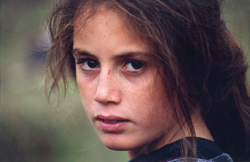 Along the Iraqi-Turkish border just days before the 2003 US invasion, a ragtag group of orphaned Kurdish children unearths and diffuses land mines to earn a living. The group's leader is a 13-year-old boy nicknamed "Satellite" for his prowess with electronic equipment. Desperate for news of the impending war, the village elders rely on him to install a satellite dish, although no one in the village understands the language of the foreign broadcasts. One day a willful boy, left armless by a landmine, arrives in the village with his sister, Agrin, who has seen her own share of horrors under Saddam Hussein's regime. Kurdish-Iranian director Bahman Ghobadi repeats the blend of documentary technique and fictional storytelling from his acclaimed A TIME FOR DRUNKEN HORSES. His child actors, all non-professionals, bring heartbreaking eloquence (and some welcome humor) to a devastating portrait of a people caught in the crossfire of geopolitics.
Along the Iraqi-Turkish border just days before the 2003 US invasion, a ragtag group of orphaned Kurdish children unearths and diffuses land mines to earn a living. The group's leader is a 13-year-old boy nicknamed "Satellite" for his prowess with electronic equipment. Desperate for news of the impending war, the village elders rely on him to install a satellite dish, although no one in the village understands the language of the foreign broadcasts. One day a willful boy, left armless by a landmine, arrives in the village with his sister, Agrin, who has seen her own share of horrors under Saddam Hussein's regime. Kurdish-Iranian director Bahman Ghobadi repeats the blend of documentary technique and fictional storytelling from his acclaimed A TIME FOR DRUNKEN HORSES. His child actors, all non-professionals, bring heartbreaking eloquence (and some welcome humor) to a devastating portrait of a people caught in the crossfire of geopolitics.
Producer: Bahman Ghobadi. Screenwriter: Bahman Ghobadi. Cinematographer: Shahriar Assadi. Editor: Moustafa Khergheposh, Hayedeh Safiyari. Cast: Soran Ebrahim, Avaz Latif, Saddam Hossein Feysal, Hiresh Feysal Rahman. Presented in Kurdish dialogue with English subtitles.
Saturday February 12 2005, 7:30PM
INFIDELS
(Koffar)
(2004, Iran) Directed by Bahman Kiarostami
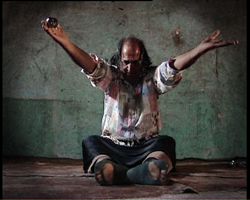 INFIDELS is a portrait of a group of Godar gypsies living in northern Iran. Believed to be of Indian descent, the Godars were forced to convert to Islam. Because they are recent converts, they are still considered infidels. This documentary weaves interviews, dances and musical performances to create this portrait of a fascinating yet little-known Iranian community. Kiarostami's clear matter-of-fact images and direct but subtle editing draw us into this world, accenting its uniqueness without taming or exoticizing it. INFIDELS is a portrait of a group of Godar gypsies living in northern Iran. Believed to be of Indian descent, the Godars were forced to convert to Islam. Because they are recent converts, they are still considered infidels. This documentary weaves interviews, dances and musical performances to create this portrait of a fascinating yet little-known Iranian community. Kiarostami's clear matter-of-fact images and direct but subtle editing draw us into this world, accenting its uniqueness without taming or exoticizing it.
Producer: Marjaneh Moghimi. Cinematographer: Morteza Poursamadi, Bahman Kiarostami. Editor: Bahman Kiarostami. Video, 40 min.
TWO BOWS
(Do Kamancheh)
(2004, Iran) Directed by Bahman Kiarostami
This remarkable documentary about two very different Iranian musicians shows that Kiarostami shares with his father (Abbas Kiarostami) an elliptical style that revels in those moments other filmmakers would edit out. In Rome, Reza Derakhshani infuses his performances of the ancient instrument, the kamancheh, with jazz and electronic rhythms as Kiarostami steals a distinctly Iranian glance at Derakhshani's wealthy Italian lifestyle, where cocktail parties give way to a nonstop bout of cheek kissing. Meanwhile in Bandar Turkaman, struggling traditional musician Bahram Berdikor despondently contemplates suicide because of the debilitating restrictions the regime has placed on his playing. Where words fail, Kiarostami's camera follows the path of the musician's gaze to the film's eloquent conclusion.
Producer: Marjaneh Moghimi. Cinematographer: Morteza Poursamadi, Bahman Kiarostami. Editor: Bahman Kiarostami. Video, 47 min.
In person: Bahman Kiarostami
Sunday February 13 2005, 7:00PM
ABADAN
(2003, Iran) Directed by Mani Haghighi
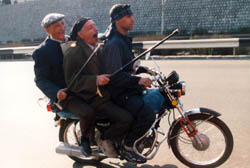 Banned in its homeland by the Ministry of Culture and Islamic Guidance, ABADAN then suffered a second insult when it was snubbed by a European festival for not being "Iranian enough." When Marjan's aging father runs away from home, she enlists the help of her estranged husband to track him down, and then unexpectedly forms a friendship with her husband's young girlfriend. While there is clearly plenty to bother the Islamic censors in this story of casual adultery and elder neglect told through dialogue as colorful as in an episode of THE SOPRANOS, what sets ABADAN apart is the nakedness of its characters. Ultimately indifferent to the plight of the old man they seek, they are exposed as manipulative, funny and absolutely human.
Banned in its homeland by the Ministry of Culture and Islamic Guidance, ABADAN then suffered a second insult when it was snubbed by a European festival for not being "Iranian enough." When Marjan's aging father runs away from home, she enlists the help of her estranged husband to track him down, and then unexpectedly forms a friendship with her husband's young girlfriend. While there is clearly plenty to bother the Islamic censors in this story of casual adultery and elder neglect told through dialogue as colorful as in an episode of THE SOPRANOS, what sets ABADAN apart is the nakedness of its characters. Ultimately indifferent to the plight of the old man they seek, they are exposed as manipulative, funny and absolutely human.
Producer: Ahmad Ali Moussavi, Jacques Tizabi, Mehdi Safavi, Chris Briggs. Screenwriter: Mani Haghighi. Cinematographer: Mahmoud Kalari. Editor: Mastaneh Mohajer. Cast: Dariush Asadzadeh, Jamsheed Mashayekhi, Fatemeh Motamed Arya, Hedeyeh Tehrani. Video, 83 min.
Friday February 18 2005, 7:30PM
THE RIVER'S END
(Gavkhouni)
(2004, Iran) Directed by Behrooz Afkhami
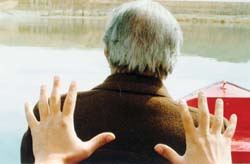 This strange, beguiling story of a young man failing to come to terms with his father's death is told in a modest, original style that heralds an idiosyncratically personal voice for Iranian cinema. Against stark and beautiful images, an increasingly dark and laconic voiceover speaks of the unnamed protagonist's dead father (played by famed actor Ezzatolah Entezami) and obsessively revisits the father's love for Isfahan's river. Major life events occur?the narrator loses his job, gets married, moves to Tehran?but the narrator's attention remains with the memory of his father, who visits him in watery, waking dreams. Though the film's dreamlike style demands our attention, it never gets in the way of this very moving and precise depiction of the subterranean effects of a parent's death. This strange, beguiling story of a young man failing to come to terms with his father's death is told in a modest, original style that heralds an idiosyncratically personal voice for Iranian cinema. Against stark and beautiful images, an increasingly dark and laconic voiceover speaks of the unnamed protagonist's dead father (played by famed actor Ezzatolah Entezami) and obsessively revisits the father's love for Isfahan's river. Major life events occur?the narrator loses his job, gets married, moves to Tehran?but the narrator's attention remains with the memory of his father, who visits him in watery, waking dreams. Though the film's dreamlike style demands our attention, it never gets in the way of this very moving and precise depiction of the subterranean effects of a parent's death.
Based on the novel by Jafar Modaress Sadeghi. Producer: Ali Moallem. Screenwriter: Behrooz Afkhami. Cinematographer: Mohammed Aladpoush. Editor: Behrooz Afkhami. Cast: Ezzatolah Entezami, Bahram Radan, Bahareh Rahnama, Soruch Sehhat. 35mm, 96 min.
Saturday February 19 2005, 7:30PM
SILENCE OF THE SEA
(Khamushiye Darya)
(2003, Iran) Directed by Vahid Mousaian
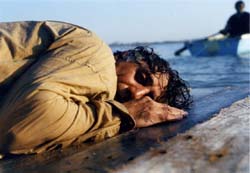 Settled comfortably in Sweden, Siavash finds himself at middle age consumed with guilt for having abandoned his parents when he left Iran. A hasty attempt to return finds Siavash stranded in the free port of Qeshm, an island no-man's-land, where the locals are as puzzled by this backwards-fleeing refugee as he is by their unfamiliar customs. Mousaian's second feature is an accomplished mix of allegory, understated drama and absurdist comedy filmed in a muted, detailed palate. This tale of a worldly Iranian out of step among his more traditional countrymen poetically illustrates the poignancy of the expatriate's condition.
Settled comfortably in Sweden, Siavash finds himself at middle age consumed with guilt for having abandoned his parents when he left Iran. A hasty attempt to return finds Siavash stranded in the free port of Qeshm, an island no-man's-land, where the locals are as puzzled by this backwards-fleeing refugee as he is by their unfamiliar customs. Mousaian's second feature is an accomplished mix of allegory, understated drama and absurdist comedy filmed in a muted, detailed palate. This tale of a worldly Iranian out of step among his more traditional countrymen poetically illustrates the poignancy of the expatriate's condition.
Producer: Bahman Maghsoudlou, Rouhollah Baradari. Screenwriter: Vahid Mousaian. Cinematographer: Mohammad Reza Sokout. Editor: Nazanin Mofakham. Cast: Masoud Rayegan, Hossein Sheydai. Presented in Persian and Swedish dialogue with English subtitles. 35mm, 82 min.
AHMAD MAHMOUD: A NOBLE NOVELIST
(2004, United States/Iran) Directed by Bahman Maghsoudlou
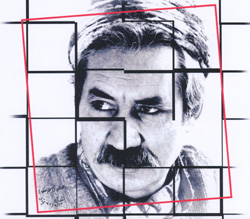 Ahmad Mahmoud (1931-2002) was a leading Iranian novelist who, over his fifty-year career, published nine short story collections and six novels, including The Native Boy (1972), The Strangers (1972) and The Neighbors (1974). His writing reflects his political engagement, his concern for the poor and the working class, and his love for his native region of Khuzestan. Mahmoud testifies eloquently to all these concerns in lengthy, and moving, on-camera interviews. Maghsoudlou's portrait of this well-loved and incredibly talented writer, later overlooked as anti-revolutionary, attests to the extreme difficulties often faced by Iranian writers.
Ahmad Mahmoud (1931-2002) was a leading Iranian novelist who, over his fifty-year career, published nine short story collections and six novels, including The Native Boy (1972), The Strangers (1972) and The Neighbors (1974). His writing reflects his political engagement, his concern for the poor and the working class, and his love for his native region of Khuzestan. Mahmoud testifies eloquently to all these concerns in lengthy, and moving, on-camera interviews. Maghsoudlou's portrait of this well-loved and incredibly talented writer, later overlooked as anti-revolutionary, attests to the extreme difficulties often faced by Iranian writers.
Producer: Bahman Maghsoudlou. Writer: Bahman Maghsoudlou. Cinematographer: Shahriar Assadi. Editor: Bahman Maghsoudlou. Video, 56 min.
In person: Bahman Maghsoudlou
Saturday February 26 2005, 7:30PM
THE COLOR OF LOVE
(Rangeh Eshgh)
2003, Iran/United States) Directed by Maryam Keshavarz
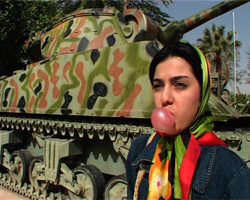 Using the weeklong Ashura festival as a framework, THE COLOR OF LOVE documents the changing face of love and politics in the ancient city of Shiraz. As the older generation performs cathartic rituals, the city's youth are left to their own devices. They spend this time cruising the public squares, hoping for a sideways glance or a brief note from a potential lover. The film's 29-year-old, New York-based director investigates the way these shifting mores have surfaced in a culture entrenched in traditional values and how they have been influenced by western culture in the form of satellite television and the Internet. By interviewing different generations of Iranians, Keshavarz attempts to uncover how ideas of love, romance, marriage and sex have evolved in a society where politics and culture are inextricably linked.
Using the weeklong Ashura festival as a framework, THE COLOR OF LOVE documents the changing face of love and politics in the ancient city of Shiraz. As the older generation performs cathartic rituals, the city's youth are left to their own devices. They spend this time cruising the public squares, hoping for a sideways glance or a brief note from a potential lover. The film's 29-year-old, New York-based director investigates the way these shifting mores have surfaced in a culture entrenched in traditional values and how they have been influenced by western culture in the form of satellite television and the Internet. By interviewing different generations of Iranians, Keshavarz attempts to uncover how ideas of love, romance, marriage and sex have evolved in a society where politics and culture are inextricably linked.
Producer: Azar Keshavarz, Karim Arzadi, Carla Roley, Hossein Keshavarz. Cinematographer: Maryam Keshavarz. Editor: Maryam Keshavarz, Andrea Chignoli. Video, 69 min.
ZOHRE & MANOCHEHR
(2004, France/Iran) Directed by Mitra Farahani
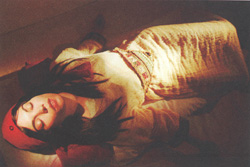 Despite the official conservatism regarding sexual mores and practices, Iran is like anywhere else: there's a lot going on underneath the surface. Paris-based filmmaker Farahani returns to Iran to interview people about love and sex in contemporary Iran. While the interviewees include a prostitute and a (male-to-female) transsexual, Farahani focuses on sex and courtship between young men and women, and the voices of women are especially prominent here. A framing device dramatizing a love poem by Iraj Mirza (including a frank use of nudity) links the film's interviews to a traditional Persian culture in which eroticism was celebrated, not censored.
Despite the official conservatism regarding sexual mores and practices, Iran is like anywhere else: there's a lot going on underneath the surface. Paris-based filmmaker Farahani returns to Iran to interview people about love and sex in contemporary Iran. While the interviewees include a prostitute and a (male-to-female) transsexual, Farahani focuses on sex and courtship between young men and women, and the voices of women are especially prominent here. A framing device dramatizing a love poem by Iraj Mirza (including a frank use of nudity) links the film's interviews to a traditional Persian culture in which eroticism was celebrated, not censored.
Producer: Cyriac Auriol. Cinematographer: Jérome Krumenacker. Editor: Sou Abadi. Video, 70 min.
In person: Maryam Keshavarz
Saturday March 5 2005, 7:30PM
BEAUTIFUL CITY
(Shahr-e ziba)
(2004, Iran) Directed by Asghar Farhadi
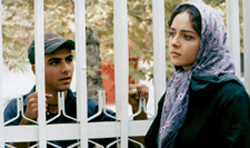 An engrossing melodrama about vengeance and forgiveness, BEAUTIFUL CITY tells the story of two people who come together to save the life of a young man, sentenced to die for having murdered his girlfriend. The murderer's sister (Taraneh Alidoosti from I AM TARANEH, 15) and his best friend try desperately to convince the victim's father to agree to commute the sentence. When love blossoms between the two young people, their happiness soon leads to a wrenching choice. As in his previous film DANCING IN THE DUST, Farhadi melds tragedy, humor and romance into a touching and tender examination of sacrifice and redemption. In a cast of strong actors, Babak Ansari stands out as A'la, the unselfconsciously charming, commonsensical young cellmate of the condemned boy.
An engrossing melodrama about vengeance and forgiveness, BEAUTIFUL CITY tells the story of two people who come together to save the life of a young man, sentenced to die for having murdered his girlfriend. The murderer's sister (Taraneh Alidoosti from I AM TARANEH, 15) and his best friend try desperately to convince the victim's father to agree to commute the sentence. When love blossoms between the two young people, their happiness soon leads to a wrenching choice. As in his previous film DANCING IN THE DUST, Farhadi melds tragedy, humor and romance into a touching and tender examination of sacrifice and redemption. In a cast of strong actors, Babak Ansari stands out as A'la, the unselfconsciously charming, commonsensical young cellmate of the condemned boy.
Producer: Iraj Taqipor. Screenwriter: Asghar Farhadi. Cinematographer: Ali Loqmani. Editor: Shahrzad Ponya. Cast: Faramarz Gharibian, Taraneh Alidoosti, Babak Ansari, Ahu Kheradmand. 35mm, 100 min.
Friday March 11 2005, 7:30PM
TINY SNOWFLAKES
(Danehaye rize barf)
(2003, Iran) Directed by Ali Reza Amini
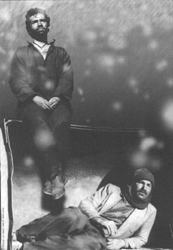 The two scruffy caretakers at a remote, ramshackle mine have nothing but each other and a monotonous routine. Their boredom is broken by the occasional arrival of groups of miners who work for a few weeks and leave?until one day the two spot a teacher on her way to and from school on a neighboring road. The men's fevered attempts to catch a daily glimpse of this far-off figure give their lives hope even as it produces friction among them. Out of these minimal elements, Ali Reza Amini (director of last year's LETTERS IN THE WIND) fashions a hypnotic cinematic experience. With his second film, Amini has already developed a unique style, made up of silence, visual repetition, the sudden, startling eruption of arresting images, and echoes of Tarr and Tarkovsky. The two scruffy caretakers at a remote, ramshackle mine have nothing but each other and a monotonous routine. Their boredom is broken by the occasional arrival of groups of miners who work for a few weeks and leave?until one day the two spot a teacher on her way to and from school on a neighboring road. The men's fevered attempts to catch a daily glimpse of this far-off figure give their lives hope even as it produces friction among them. Out of these minimal elements, Ali Reza Amini (director of last year's LETTERS IN THE WIND) fashions a hypnotic cinematic experience. With his second film, Amini has already developed a unique style, made up of silence, visual repetition, the sudden, startling eruption of arresting images, and echoes of Tarr and Tarkovsky.
Producer: Ali Reza Amini. Screenwriter: Ali Reza Amini. Cinematographer: Toraj Aslani. Editor: Ali Reza Amini. Cast: Mohsen Tanabandeh, Majid Babrami. 35mm, 75 min.
------------------------------------
All programs screen at the James Bridges Theater in Melnitz Hall, located on the northeast corner of the UCLA Westwood campus, near the intersection of Sunset Boulevard and Hilgard Avenue.
Advance tickets for all films screening at UCLA are available for $8 at www.cinema.ucla.edu Tickets are also available at the theater one hour before showtime: $7 general admission; $5 students, seniors and UCLA Alumni Association members with ID.
Parking is available adjacent to the James Bridges Theater in Lot 3 for $7; there is free parking on Loring Ave. after 6:00 p.m. on weekdays and all day on weekends.
INFO: www.cinema.ucla.edu / 310.206.FILM.
###
 Related Links Related Links
 Film Index Film Index
 Front Page Front Page
|
